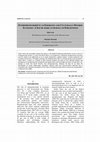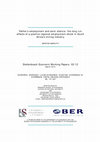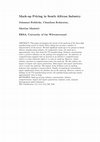Papers by Martine Mariotti

Social Science History
Military enlistment is highly selective for reasons of both labor demand and supply. An early-twe... more Military enlistment is highly selective for reasons of both labor demand and supply. An early-twentieth-century evolution of military technology that shifted the demand for workers of different stature illustrates the importance of labor demand beyond the commonly discussed influences originating with labor supply. English-born soldiers in the Anglo-Boer War (1899–1902) were taller, on average, than those of World War I (1914–18), yet these differences cannot be attributed to standard of living or business cycle influences on the labor market. Rather, we argue, the mechanization and bureaucratization of warfare increased the relative value of shorter people permitting a decline in the average height of soldiers. Technological change over the period of these two wars affected labor demand in a way that must be recognized before using this evidence to test hypotheses about changes in population health.
European Review of Economic History
This series replaces the former series under the title Meddelande från ekonomisk-historiska insti... more This series replaces the former series under the title Meddelande från ekonomisk-historiska institutionen, Lunds universitet. The change of name reflects the orientation of the series towards an international readership. The series is multilingual, but the majority of the working papers appear in English.
The Economic History Review

South African Journal of Economic and Management Sciences
South Africa has consistently ranked very poorly in the Global Entrepreneurship Monitor survey in... more South Africa has consistently ranked very poorly in the Global Entrepreneurship Monitor survey in terms of entrepreneurial activity. It is clear that South Africa is not producing a sufficiently entrepreneurial economy and this needs to be addressed so as to create employment, expand markets, increase production and revitalize communities. This paper examines the entrepreneurial traits of a diverse group of young adults in South Africa. It draws on a sample of 609 university students and looks at their attitudes towards and perceptions of entrepreneurship, entrepreneurial opportunities and the broader economic environment in an attempt to clarify how South Africans view entrepreneurship. Although the data do not allow the identification of causal relationships, descriptive statistics show that socioeconomic elements play a noteworthy role in people's perceptions of the value of entrepreneurship and thus need to be incorporated in entrepreneurial models.
The Journal of Imperial and Commonwealth History
Development Southern Africa, 2001
Economic History Review, Aug 1, 2012
Anecdotal evidence shows that despite extensive restrictions on the hiring of African workers, th... more Anecdotal evidence shows that despite extensive restrictions on the hiring of African workers, these workers were increasingly employed in semiskilled occupations throughout the apartheid era. This article shows that White skill acquisition throughout the apartheid era reduced the supply of White semiskilled workers and led to the removal of job reservation, the process of reserving skilled and semiskilled jobs for Whites. Although job reservation declined, there is little evidence of a decline in racial segregation in the labour market. It is concluded that the transformation in the labour market was driven by White economic incentives rather than any evident change in White preferences regarding racial segregation.
Dev South Afr, 2001
This article explores changing conditions in South African real capital markets. Noteworthy is th... more This article explores changing conditions in South African real capital markets. Noteworthy is the evidence of strong restructuring in this market during the 1990s. Whereas the 1970s and 1980s showed the best investment performance among primary commodity sectors and sectors with strong parastatal involvement, the highest investment rates of the 1990s have been associated with the manufacturing industry. We show that the real user cost of capital and capital productitivity contribute plausible determinants of investment rates in South ...
NBER working papers are circulated for discussion and comment purposes. They have not been peerre... more NBER working papers are circulated for discussion and comment purposes. They have not been peerreviewed or been subject to the review by the NBER Board of Directors that accompanies official NBER publications.
South African Journal of Economics, 2002
EMPLOYMENT CREATION in the South African labour market has been less than healthy for some period... more EMPLOYMENT CREATION in the South African labour market has been less than healthy for some period of time. Understanding conditions within South African labour markets is crucial to developing a strategy designed to improve employment creation in the future. The present paper is to be understood as a preliminary study of the determinants of labour demand within the South African economy. 1 The main focus of the present paper is not to present estimation results, nor to provide a comprehensive explanation for the incidence ...
Anu Working Papers in Economics and Econometrics, 2009
Economic History of Developing Regions, Oct 24, 2014

Economic Development and Cultural Change, 2015
I exploit the sudden increase in employment in 1975, 1976 and 1977 in four former South African h... more I exploit the sudden increase in employment in 1975, 1976 and 1977 in four former South African homelands to compare the long term adult outcomes of children benefitting from the employment increase to those not subject to it. Using a standard difference in difference approach I find that there was severe malnutrition in the homelands resulting in stunting in African men born during the shock providing support to the foetal origins hypothesis. The employment shock did not affect other long term outcomes such as education and general health, although there is some evidence of an improvement in long term health. This study provides previously unmeasured individual level information on the quality of life in the homelands during apartheid, an era when African living standards were neglected but unmeasured because of a lack of data collection.

This paper investigates the extent of the markup of the three-digit manufacturing sectors in Sout... more This paper investigates the extent of the markup of the three-digit manufacturing sectors in South Africa taking into account a number of characteristics of the sectors. We …nd signi…cant markups to be present in South African manufacturing industry. In comparative terms, the markup is approximately twice that found for US manufacturing. Industry concentration exerts a positive in ‡uence on the markup over marginal cost. An indicator of competitiveness suggests that an increase in an industry's competitiveness relative to other industries allows it to raise its markup. However, within industry increases in competitiveness lower the markup. We also analyze the impact of import and export penetration. Both import and export penetration serve to lower the markup. The impact of the business cycle on markup indicates that markup is countercyclical. Finally, accounting for intermediate inputs signi…cantly lowers the absolute size of the markup. However, relative to …ndings on the US manufacturing sectors, SA manufacturing markups remain approximately twice as large.
Economic History of Developing Regions, 2014
Twenty years after apartheid was formally abolished it continues to shape South African society. ... more Twenty years after apartheid was formally abolished it continues to shape South African society. Its legacy persists over and above interest in it as a perverse phenomenon. We therefore find it timely, as part of our introduction to this special issue, to review some important studies of the economic aspects, and particularly some newer research by young scholars. Since so much about the apartheid system remains unexamined, Economic Research Southern Africa (ERSA) organized a workshop in March 2013 to bring together people who work on the economics of apartheid. This special issue is partly the result of papers presented at this workshop or collaborations developed there. 3







Uploads
Papers by Martine Mariotti